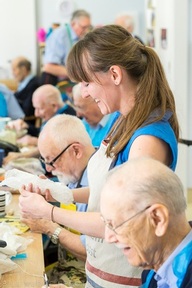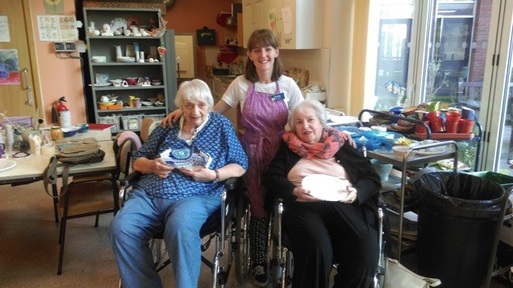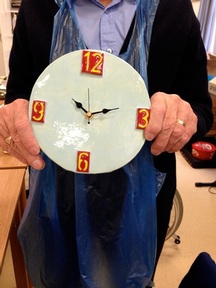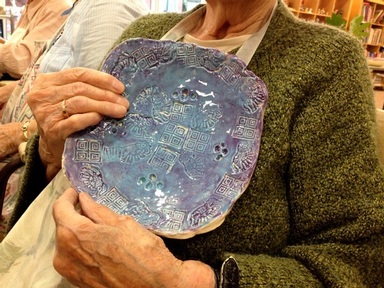'Pottery is my sanctuary, it keeps the little grey cells going' says care home resident
“Clay is a great tool to communicate and be expressive with,” says Emily Hall, a pottery teacher at Nightingale Hammerson, an independent charity which provides holistic care to older people and those living with dementia.

“As well as being a therapeutic material to manipulate and exercise the hands, it provides a blank canvas to help individuals create something they are proud of, that means something to them, that is a talking point, that they can share with their relatives and peers.”
Ms Hall began working as a part-time ceramist for the care provider in 2012 and five years later she is continuing to share her passion and pass on her skills to residents at Nightingale Hammerson.
Capturing memories
Pottery is an activity that rouses cognitive activity as much as physical. It helps older people express their creativity and is an effective way for people of all ages and abilities to explore the things they know well or have not had a chance to experience before.
Nightingale Hammerson values creative arts as a source of expression and uses pottery as a tool to connect with residents. In recent years, the home has run an exhibition called ‘The Creative Mind’, which features a series of artwork created by resident Rosalind Fleck.
The exhibition charts her journey of creative talent from childhood, adulthood and her present life living with dementia, and visually demonstrates her changing creative perceptions, highlighting a powerful connection between art, the brain and the hand.
Rosalind’s husband, 88-year-old retired architect Hans Fleck, also lives at Nightingale Hammerson care home. He attends the pottery class with his wife three times a week and thoroughly enjoys the experience of “getting mucky, being creative and capturing memories.”
“I am reasonably competent and enjoy creative work,” he said “but the only pottery I ever had the chance to get involved with was when I was 20-years-old back when I attended Norwich Art School.
“It is now a real pleasure to be offered the opportunity to participate in pottery classes and I often make my family handmade presents which sit pride of place on either their mantelpiece or wall.”
Re-master skills 
For others, it’s a chance to re-master skills previously learned. Eve Webb, another resident at Nightingale Hammerson care home used to be an art teacher and is familiar with making ceramics.
“I enjoy pottery because it engages me in something I have always enjoyed doing. As I previously worked as an art teacher I needed a new challenge in my later years.”
She added: “Seeing the pottery creation in its final form serves as a reminder of your accomplishments. It keeps the little grey cells going and the class is now my sanctuary.”
Personalised classes
Pottery sessions run at Nightingale Hammerson’s care homes three times a week. To personalise the classes, Ms Hall gets to know the personalities of each resident, as well as their interests and abilities.
She often provides one-to-one support and offers sessions in residents bedrooms, where they can at times, feel more comfortable and at ease.
She added: “The work I carry out in classes is developed around hand building techniques, adapted to suit the abilities of each resident. For example, if a resident has only the use of one hand or can only see certain colours I will work around these needs. Some residents only enjoy the making process and others just painting so I have pieces on the go to support everyone.
“For inspiration, I sometimes give a talk or show footage about potters, techniques and styles of pottery. We also try and visit exhibitions and galleries so residents can explore pottery archaeology.”
’Our hands are an outlet for creativity’

There is a common perception that moving into a care home involves a loss of independence and autonomy, and with over 400,000 people estimated to be living in care homes in the UK, keeping residents occupied with meaningful activities is essential to prevent them from becoming lethargic, depressed or even isolated.
Many care homes, including Nightingale Hammerson, are including pottery sessions in their weekly schedules as an effective therapeutic and well-being activity.
According to National Activity Providers Association (NAPA), meaningful activities are defined as those that provide emotional, creative, intellectual and spiritual stimulation and those which give individuals a sense of purpose.
Pottery can alleviate stress
According to Ms Hall, the movement of making pottery is gentle yet strengthening to the hands, wrists, and arms. This can be beneficial to those prone to arthritis in the hands, as it promotes joint movement and dexterity.
It also allows residents to move away from any worries or anxieties they may have and shift their focus towards creation. Being able to fully focus on something helps the mind relax and expand, which helps to reduce stress and encourage sociability.
She added: “Stress can often lead to feeling sensations of pain and discomfort, and since pottery is a hobby known for reducing stress and boosting self-esteem, pain caused by stress may be alleviated while taking part in the activity.”
Pottery can provide that much needed ‘break’

Caroline Abrahams, charity director at Age UK, believes taking part in a varied range of activities can provide that much needed 'break' from everyday care routines. She said: “It’s great to see more care homes offering imaginative activities to stimulate residents and encourage participation and exercise.
“We know that loneliness is a big issue for many older people in later life, including some living in care homes. The more high-quality activities on offer for residents to engage with, the better their experience and stay are likely to be.”
Within a year of starting at Nightingale Hammerson, Ms Hall branched out as a freelancer, offering classes to other homes across London and Surrey such as the Royal Hospital Chelsea and Sunrise care homes.
Nightingale Hammerson is one of the Jewish community’s leading providers of care for older people. They run three care homes in London, each offering residential, nursing and dementia care.
click here for more details or to contact Nightingale Hammerson
Latest Features News
 25-Nov-19
2019 Election: Boris Johnson leaves social care in 'too difficult box' but Labour vows to end 'crisis'
25-Nov-19
2019 Election: Boris Johnson leaves social care in 'too difficult box' but Labour vows to end 'crisis'
 18-Oct-19
Podcast: Wendy Mitchell and dementia: 'My biggest fear is not knowing who my daughters are'
18-Oct-19
Podcast: Wendy Mitchell and dementia: 'My biggest fear is not knowing who my daughters are'
 27-Sep-19
Exclusive: Care minister backs care workers' call for time off to grieve and attend funerals
27-Sep-19
Exclusive: Care minister backs care workers' call for time off to grieve and attend funerals
 19-Sep-19
Podcast: Gyles Brandreth says poetry helps ward off dementia
19-Sep-19
Podcast: Gyles Brandreth says poetry helps ward off dementia
 30-Aug-19
Edinburgh Fringe funnyman joins comics facing toughest audience at care home gig
30-Aug-19
Edinburgh Fringe funnyman joins comics facing toughest audience at care home gig